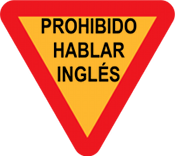 This past month I went down to “the valley” for a week–that is, the Rio Grande Valley of south Texas and northern Mexico. Most people on the Texas side are bilingual, and I was soon exposed to that interesting phenomenon known to some as “Spanglish.” Start a sentence in Spanish, switch to English in the middle, switch back to Spanish a few phrases later. It changed my perspective a little, since before that time, I always felt a bit discouraged when Spanish speakers talked to me in English–I guess I assumed they thought I couldn’t speak Spanish very well. But hearing how they talk to each other showed me that the language switching is something they just do out of habit.
This past month I went down to “the valley” for a week–that is, the Rio Grande Valley of south Texas and northern Mexico. Most people on the Texas side are bilingual, and I was soon exposed to that interesting phenomenon known to some as “Spanglish.” Start a sentence in Spanish, switch to English in the middle, switch back to Spanish a few phrases later. It changed my perspective a little, since before that time, I always felt a bit discouraged when Spanish speakers talked to me in English–I guess I assumed they thought I couldn’t speak Spanish very well. But hearing how they talk to each other showed me that the language switching is something they just do out of habit.
However, this change in perspective hasn’t been the most positive for my language learning. Yesterday evening I worshiped with a Spanish-speaking congregation, and as I was talking to people afterwards, I found myself responding in English when spoken to in that tongue. My conscience approved, and I’m sure they meant nothing by it (it’s just habit to speak English to native English speakers!), but as one who is wanting to improve my Spanish skills, I should have restricted myself to Spanish–it’s not like they wouldn’t understand me! To my credit, there was one person who spoke to me in English, to whom I responded in Spanish, but I certainly could have done better.
You see, the only way to learn to speak a language is to speak it (surprise!), and every English word you speak to a speaker of your target language is a missed opportunity. Benny the Irish Polyglot says that not speaking English is the smartest decision you’ll ever make to achieve fluency. Now the challenge for me is to take this attitude with me to Belgium. I have no idea how many French-speaking Belgians know English, but for those who do, I will have to take special care to avoid using my native tongue. This will especially be a challenge given my currently very small knowledge of the language, but I believe this is the key to making quick progress!